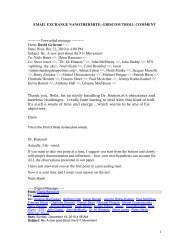court of appeal for ontario - academicfreedom.ca
court of appeal for ontario - academicfreedom.ca
court of appeal for ontario - academicfreedom.ca
You also want an ePaper? Increase the reach of your titles
YUMPU automatically turns print PDFs into web optimized ePapers that Google loves.
f{lay.<br />
9 2012 lr20PNl ilo.<br />
1695 P t/ 14<br />
Page:4<br />
rb) a <strong>ca</strong>se management ludge in a civil proceedirrg may makc procedural rulings<br />
inoiuding preventing 0 party fi'om bringing a motion to determine arr issue that has<br />
ah'eady been decidcd. The appli<strong>ca</strong>tion <strong>of</strong> the doctrines <strong>of</strong> abuse <strong>of</strong> process and<br />
collatcral attack on an existing final order are legal principles that a <strong>ca</strong>se<br />
mailtgement judge may apply to ensure the just, expeditious and least cxpensive<br />
manner <strong>of</strong> proceeding. The doctrine <strong>of</strong> abuse <strong>of</strong> process is a flexible doctrine which<br />
allows the <strong>court</strong> to prevent the rnisuse <strong>of</strong> its process in a way lhot would be<br />
manifcstly unfair to a party or would in somc way bring the administlation <strong>of</strong><br />
justice into disrepute.<br />
(c) In the text The Law <strong>of</strong> Evidcncc, Third Edition by Bryant, Lederman and Fuerst, at<br />
pua 1954 the author states thar res judi<strong>ca</strong>ta is a rule <strong>of</strong> cvidence and not a rule <strong>of</strong><br />
substontive law:<br />
Although the principle <strong>of</strong> resTrdi<strong>ca</strong>ta is sometimes rcferued to as a<br />
rule <strong>of</strong> substantive law, the better view is that it is a rule <strong>of</strong> evidencc,<br />
Essentially, the parly against whom thb suit ol issue was decided rs<br />
estopped fi'om pr<strong>of</strong>fering evidence to contradict that result.<br />
(d) Mr. Ran<strong>court</strong> was not denied procedural fairness as he had previously sought<br />
permission to allow members <strong>of</strong> the publio to attond at the closs-examinations on<br />
the affidavits bc<strong>for</strong>e Master Macleod and his requcst rvas denied. As a result, there<br />
was also no denial <strong>of</strong> naturai iusticc.<br />
(e) (i) In the criminal <strong>ca</strong>se in R. v. Gordon, [1998] O,J. No.4043 at para. 108,<br />
Hill J. held that closs-examination on affidavits befole an examinor was not<br />
subject to the open <strong>court</strong> principle.<br />
(ii)<br />
In Gordon, supra, Hill J., followed the reasoning <strong>of</strong> the Supreme Courr<br />
decision ir Canadian Broad<strong>ca</strong>sting Corporation v. Atlorney General <strong>for</strong><br />
New Brunswrck, (1997), I l0 C,C,C (3d) 193 (S C C.),<br />
At para. 108, Hill J, stated as follows:<br />
,,, it may be that the open <strong>court</strong> philosophy protected under<br />
s. 2(b) <strong>of</strong> the Charter does not extend to every venue in which<br />
crirninal law is administered -- while it has long extended to<br />
<strong>court</strong>s themselves other considemtions may apply to sites not<br />
histori<strong>ca</strong>lly considercd to be public alcnas. IJnp.osing an open<br />
coufi imperative on the examiner's envilonment. relating to<br />
cross-examination on affidavits filed in criminal proceedings.<br />
is unnccessary and unworkable. The record dealt wittr befble<br />
thc examincr, the affidavit and thc closs-cxamination, are filed<br />
with the <strong>court</strong> and used in the pre-trial motiorr argued in open<br />
<strong>court</strong>. fEmphasis added]<br />
(iii) A number <strong>of</strong> other authorities have also held that an examiner's <strong>of</strong>fice is not<br />
a public <strong>court</strong>. lt, v. Gordon, suprd, at pp.l04:



